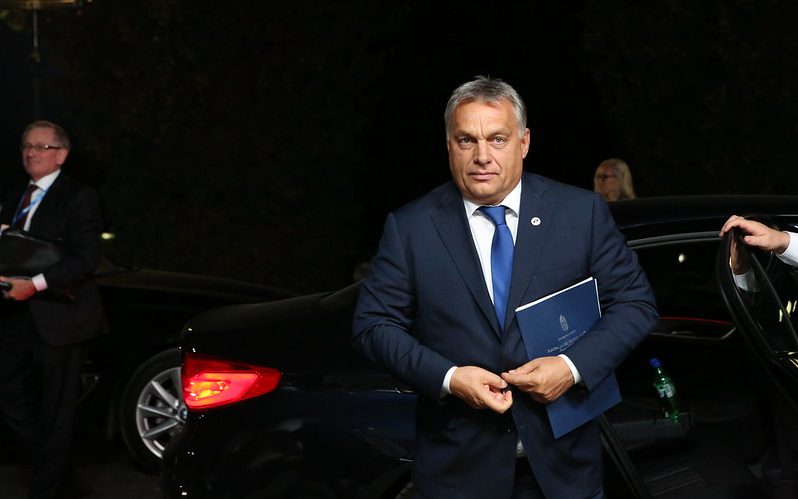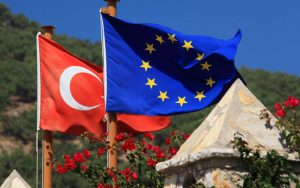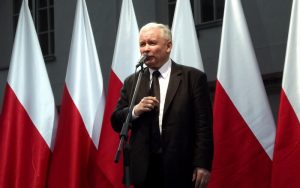Hungarian prime minister Orbán has been performing a balancing act between the West and Russia for some time. While actively being part of western institutions, such as the European Union and NATO (as a former member of the Warsaw Pact during the Cold War), Orbán has continued to look further east, actively seeking diplomatic relationships and business ties with Russia as well as China. This (economic) strategy is summarised under the so-called Eastern Opening Policy (“Keleti Nyitás”) that Orbán introduced in 2011, after his election victory.
Over the last years under the Fidesz government, Hungary’s entanglement with Russia, next to China, grew. Orbán has continuously made concessions to Putin and demonstrated that he seeks a closer relationship with Russia than some other EU countries do.
In 2014, the Hungarian government signed an agreement with Russia on the construction of two new nuclear blocks – also known as Paks II. It included a loan from Russia of €10 billion, which covered 80% of the total costs of the project and was to be paid back until 2026. Apart from the questionable nature of this project, being financed by Russia and lacking Hungarian parliamentary support, there was also an incredible lack of transparency: The Orbán government aimed to keep the contracts confidential for 30 years, however, the time period was later cut back to 10 years. To add insult to injury, scientists and experts on geology concluded that the site where Paks II would be built is “not suitable for the construction of a nuclear power plant” because it is at heightened risk of earthquakes.
Then, in 2019, the headquarters of the Russian International Investment Bank (IIB) moved to Budapest and granted some of its employees immunity, causing concern over having this bank operate in an EU member state and possibly about becoming a Russian spy and money-laundering hub in the EU. Notably, after the start of the Russian invasion, the Czech Republic, which is also a member of the Bank, decided to leave it as soon as possible and also called on other EU member states to follow suit. Next to the Czech Republic, also the EU members Bulgaria, Slovakia, Romania and its host country, Hungary, are members of the IIB. Yet, Hungary has not expelled the IIB from its territory, which could be considered an attempt not to antagonise Russia.
Lastly, in 2022 shortly before the beginning of the Russian attack on Ukraine, Orbán travelled to Moscow to meet his counterpart, a journey he described as a “peace mission”. Moreover, Orbán mentioned that the “other” goal of this meeting is to increase natural gas supplies from Russia due to prices hikes in Europe, effectively aiming to secure more cheap gas for Hungary,
Needless to say, this “peace mission” was not only unsuccessful but also demonstrated that its primary concerns were economic matters and his desire to continue cooperation with Russia, despite their military buildup on the border with Ukraine. In essence, this trip once again demonstrated that Orbán is just a pawn for Putin.
Since the Russian invasion of Ukraine and the start of the war in Ukraine, Orbán seems to have a hard time balancing his close relationship with Moscow while at the same time joining the EU sanctions package against Russia and supporting EU condemnation of Russian aggression. Orbán is a strategist and opportunist, always trying to push to the limits but never further.
One reason that plays into the prime minister’s balancing act is the election he faces on 3rd April 2022: not wanting to upset any of his voters, he tries to come across as diplomatic, by not exactly condemning Russian actions in Ukraine but also not outright denying what is happening in Ukraine due to Russia. He knows that vetoing the EU measures would not only lead to backlash from the EU but may also harm him in his election campaign as part of his voter base is appalled by the Russian aggression towards Ukraine (also note that there are Hungarian minorities living in western Ukraine). Yet, openly condemning Russia and speaking out against the country could also hurt the likelihood of him being reelected, given that another portion of his voter base is pro-Russian. Hence, voters of the governing party are increasingly split on the war in Ukraine and therefore Orbán seeks to cater to both.
Instead, he reiterates that it is important to keep the peace and talks about a war that is taking place in a neighbouring country, without mentioning the aggressor who started this war: Russia, or rather, Vladimir Putin.
Orbán also refused to supply lethal weapons to Ukraine and did not allow weapons transports to transit through Hungary because he wants Hungary to “stay out of the conflict”. In addition, while Orbán did not veto any EU sanctions on Russia, he also made clear that he would block sanctions targeting Russian oil and gas.
The Hungarian prime minister also ignored calls to stop the expansion of the aforementioned Russian-funded Paks II Nuclear Plant.
Then, on 15th March, three Eastern European leaders, the prime ministers of Poland, Slovenia and the Czech Republic, travelled to Kyiv amidst the ongoing fighting, a strong signal that demonstrated their alignment with and support for Ukraine. Only Hungarian prime minister Orbán was missing. This could be because the 15th of March marks an important holiday for Hungary. But it is safe to assume that Orbán would not have joined the trip another day. As his press officer stated: “The premier is aware of the visit, but he is not planning to go to Kyiv at the moment.”
The Ukrainian president Zelenskyy confronted Hungary in a recent speech, stating that they had to decide who they are with, also alluding to the balancing act that Orbán is performing and the fact that Hungary does not send weapons to Ukraine as other European states and, most notably, also non-NATO EU members did. The Hungarian reply to the Ukrainian president was that supplying weapons to Ukraine was “against Hungary’s interests“, an excuse the government repeatedly used in this matter.
In response to Zelenskyy calling out the Hungarian government’s hypocrisy, a pro-government newspaper’s headline stated “Zelenksyy is attacking us now“, spinning the narrative and not mentioning the aggressor in this conflict: Putin.
The fact that the Hungarian government helped the spread of pro-Russian narratives and propaganda from the beginning of the war and continues to do so is not only outrageous but also shameful.
By now, even Orbáns former allies within the EU in the Visegrad Group (also know as Visegrad Four or V4)1 seem to have abandoned him due to his pro-Russian stance. Only recently, a planned meeting of defence ministers of the V4 countries in Budapest was cancelled over Hungary’s questionable Ukraine policy.
Nonetheless, it seems that the Hungarian government will continue to defend its position, aiming to portray itself as a neutral party to the conflict and the defender of the Hungarian people’s interests. In reality, the government is being a hypocrite and only defending its own interests: not upsetting their Russian friends, while also aiming to appear statesmanlike and using the rally around the flag effect to collect votes for the forthcoming parliamentary election.
Sources Kovács, Z. (2022): PM Orbán: Visit to Moscow is a peace mission, About Hungary, https://abouthungary.hu/blog/pm-orban-visit-to-moscow-is-a-peace-mission Balogh, E. (2017): QUESTIONS ABOUT THE SAFETY OF THE PAKS II POWER PLANT, Hungarian Spectrum, https://hungarianspectrum.org/2021/05/19/questions-about-the-safety-of-the-paks-ii-power-plant/ Balogh, E. (2019): AMERICAN CONCERNS OVER THE INTERNATIONAL INVESTMENT BANK’S PRESENCE IN BUDAPEST: A TIMELINE, Hungarian Spectrum, https://hungarianspectrum.org/2019/08/14/american-concerns-over-the-international-investment-banks-presence-in-budapest-a-timeline/ Bayer, L. (2022): Hungary refuses to allow weapons transit to Ukraine, Politico, https://www.politico.eu/article/hungary-foreign-minister-peter-szijjarto-weapon-transit-ukraine/ Coakley, A. (2022): The E.U. Is United Against Russia—With One Notable Exception, TIME, https://time.com/6159342/european-union-russia-hungary/ Euronews (2022): Zelenskyy’s demands for Ukraine ‘not in Hungary’s interests’, says Orban, https://www.euronews.com/2022/03/25/zelenskyy-tells-hungary-s-viktor-orban-to-decide-who-you-are-with Gall, C. & Stevis-Gridneff, S. (2022): On a trip shrouded in secrecy, 3 European leaders travel to Kyiv to offer support, The New York Times, https://www.nytimes.com/2022/03/15/world/europe/european-leaders-ukraine-trip.html Garamvolgyi, F. (2022): Twitter Status 26.03.2022, Twitter, https://twitter.com/floragaramvolgy/status/1507694036991328265 Hungary Today (2022): Ukrainian War – Orbán: ‘Let’s preserve Hungary’s peace and security, https://hungarytoday.hu/orban-ukrainian-war-ukraine-peace/ Istrate, D. (2021): RUSSIAN INFLUENCE IN HUNGARY: THE CASE OF PAKS 2 AND THE KREMLIN’S INFLUENCE-SEEKING EFFORTS THROUGH NUCLEAR ENERGY, European Values Center for Security Policy, https://europeanvalues.cz/wp-content/uploads/2021/03/russian-influence-in-hungary24.3-final1.pdf Komuves, A. & Szakacs, G. (2022): Hungarians protest Ukraine invasion, Russian bank in Budapest, Reuters, https://www.reuters.com/world/europe/hungarians-protest-ukraine-invasion-russian-bank-budapest-2022-03-01/ Kreko, P. (2022): Viktor Orban Is the West’s Pro-Putin Outlier, Foreign policy, https://foreignpolicy.com/2022/03/20/viktor-orban-is-the-wests-pro-putin-outlier/ Krzysztoszek, A. et al. (2022): V4 meeting cancelled over Hungary’s Ukraine policy, Euractiv, https://www.euractiv.com/section/politics/short_news/v4-meeting-cancelled-over-hungarys-ukraine-policy/ Makszimov, V. (2022): Many Fidesz voters blame Ukraine for the war, Euractiv, https://www.euractiv.com/section/politics/short_news/many-fidesz-voters-blame-ukraine-for-the-war/ Obućina, V. (2020): Economic traits of the Hungarian eastern opening policy, obserwator finansowy, https://www.obserwatorfinansowy.pl/in-english/macroeconomics/economic-traits-of-the-hungarian-eastern-opening-policy-2/ Reuter (2022): Czechs call on EU allies to quit Soviet-era banks, citing security, https://www.reuters.com/markets/rates-bonds/czechs-call-eu-allies-quit-soviet-era-banks-citing-security-2022-02-25/ Rankin, J. (2022): ‘Decide who you are with’, Ukrainian leader tells Viktor Orbán, The Guardian, https://www.theguardian.com/world/2022/mar/25/ukraine-leader-volodymyr-zelenskiy-hungary-viktor-orban Spike, J. (2022): War in Ukraine is center stage at Hungary’s election rallies, abcNews, https://abcnews.go.com/International/wireStory/war-ukraine-center-stage-hungarys-election-rallies-83462637 Zsiros, S. (2022): Viktor Orban under fire for Moscow meeting with Vladimir Putin, Euronews, https://www.euronews.com/my-europe/2022/01/31/hungary-s-orban-under-fire-for-moscow-meeting-with-putin
Footnotes
- The Visegrad Group is a framework for the relationship between eastern EU member states Hungary, Poland, Slovakia and the Czech Republic that exists within the EU [>]







Be First to Comment